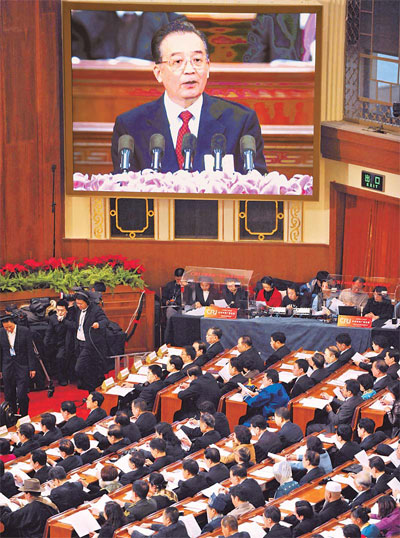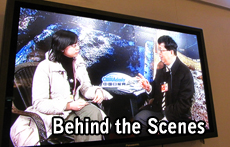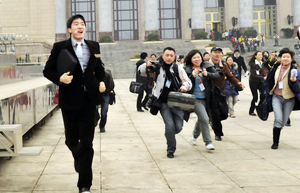Wen cautious despite 'solid recovery'
By Xin Zhiming (China Daily)
Updated: 2010-03-06 07:58
|
Premier Wen Jiabao delivers his annual work report to deputies during the opening session of the nine-day National People's Congress at the Great Hall of the People in Beijing on Friday. Liu Jin / AFP photo |
BEIJING - When Premier Wen Jiabao delivered his government work report last March, the Chinese economy was facing "the most difficult year". This year, Wen remained cautious in his remarks, even after economic experts say that China has experienced a "solid recovery".
China now faces a "crucial year" in which it must rein in inflation and stimulate domestic consumer demand, while coping with a still uncertain global economic recovery and growing trade protectionism, Wen said in this year's report to the National People's Congress on Friday.
China's GDP growth reached an impressive 8.7 percent year-on-year in 2009, higher than the government target of 8 percent.
To steer the economy toward a more entrenched recovery, Wen promised to continue the country's moderately relaxed monetary policy and pro-active fiscal policy. Its fiscal deficit is budgeted to reach 1.05 trillion yuan ($153.7 billion) this year.
"We still face a very complex situation," Wen told the country's nearly 3,000 legislators. "We must not interpret the economic turnaround as a fundamental improvement in the economic situation."
Despite the gradual recovery of the world economy, some economists are still not sure whether there will be a double-dip recession, while the United States, the world's largest economy, faces such problems as high unemployment and unstable recovery prospects.
However, the ample liquidity in the global system as a result of the varied economic stimulus measures adopted by major world economies risk stoking inflation and asset bubbles, he said.
Australia has started tightening its monetary policy while some other major economies are considering stopping their economic stimulus measures.
China has raised the reserve requirement ratio of banks, or the proportion of money they must keep as reserves, twice this year, but government officials have previously said that it is not a sign of an exit strategy.
"Although the monetary policy has been fine-tuned, the fiscal policy remains pro-active," said Jia Kang, director of the Institute of Fiscal Science Research at the Ministry of Finance. "Only the structure of fiscal spending will be adjusted," he told China Daily during the ongoing National People's Congress (NPC) and the Chinese People's Political Consultative Conference (CPPCC) National Committee session.
"It's a structural adjustment, not an exit," Jia said.
Wen said the country will earmark more resources for social causes, agriculture, people's livelihoods, environmental protection and less developed regions as the country strives to restructure its economy.
Wen also said that the yuan would remain "basically stable at an appropriate and balanced level" despite recent calls from some countries for faster yuan revaluation.
Wen warned that "trade protectionism is clearly reasserting itself" at a time of record trade disputes between China, Europe and the US.



